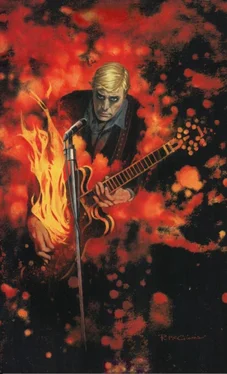Then he turned for the door, and said very quietly, without capitals, “excuse me now, i have to go take a bath.”
Shelly was undecided about the scene. He was not surprised when he read the item in Variety a week later that said:
“Personal management of Stag Preston has been undertaken by Miss Jean Friedel, recently of Colonel Jack Freeport’s staff. Miss Friedel announced the shift in positions at a press conference called to refute a rumor that ABC-
Paramount Records had severed its contractual obligations with the young 22-year-old rock’n’roll star whose meteoric rise to fame was…”
He was not surprised at all. Jean had told him she was one of the animals. She was still prowling, and though the cat and the canary can smile at one another occasionally, coexistence is no existence at all. She had broken the last tie to the hipster life for him.
He had to get out of New York, that much he knew. For a while he considered going back to Freeport, but that would have been another dead end; or rather, a cloverleaf running up and over and back down onto the same road he had traveled with Stag Preston.
It had been four years, and more. He was thirty-eight years old. No longer a hotshot, hardrock flak-man who could sell sandboxes to Arabs. He was a tired guy of thirty-eight with a lot of good years ahead if he could find the way.
So Shelly went looking for jobs. With money in the bank, he went looking for jobs. Good jobs. Honest jobs. He rejected a nightclub account, because it catered to too many people he knew. He accepted personal management of a quartet of commercial folk singers, recently graduated from Yale, because they still smelled clean, and it was possible he could do something for them before they got too cocky and too slippery and he would be forced to move on.
But he kept track of Stag and Jean.
In the trades, by word of mouth, through friends at the clubs where Stag was now playing, and at the small label for which Stag was now recording. It had been phenomenal; within a year after Shelly had left, Stag could not be booked into any of the big money venues. Vegas was stillborn for him. Forget television. Atlantic City: no-price. Hate California, for him it’s cold and it’s damp, that’s why Staggy is a tramp! He was losing a mint; and none of it belonged to him. The syndicate of small-time operators was hardly as lenient as Freeport had been, but they had been conned into accepting much of Stag’s wastrel manner as “front.”
Then a further blow was struck in the face of Stag’s waning popularity. A print of the movie he had made that night for Porter Hackett got loose. No one was able to pin the blame, and really, no one tried too hard. They were having a bit too much fun showing the flick at parties. It was copied and recopied, and though none of the big exposé rags picked it up (for some strange reason; possibly because Stag was on the way out in any case, and there was bigger game afoot), it became a Hollywood joke. A running gag that had nasty undertones. The sentiment toward Stag took a sharp downward dip after that. Even sharper than before, if that was possible.
One weekend when Shelly was in the city, he lunched with Jean, and noted that she was weary, very weary. “I’ll be pulling out soon,” she said. “I’ve made my contacts, and I’m on my way.” Shelly had thought, Yeah, on your way, honey .
Going my way?
No, the other way. Straight down.
“How’s the kid?” Shelly had asked.
“He’s been getting into hock more and more with the little men. They keep biting into his thirty-seven percent. I don’t think they’ll put up with these losses much longer. They’ve got a peculiar trapped look about them, Shelly.”
He had known what she meant. They were losing money, and that was losing life to the syndicate of small-time operators.
And still Stag lived high. Clinging to all he had left—his delusions of grandeur—he lived high, and the little men spent.
Then one night, in Kansas City, Shelly picked up a newspaper and it was on the front page. It was laid out there like an epitaph, only it wasn’t as clean and neat and final as an epitaph. It had a stink to it; it smelled of the four years Shelly had spent selling his soul under the delusion he was “making it.” It smelled of the year he had been away from Stag … a year so short it had seemed like only the turning of a page, but some years are like that … free and open and clear and perhaps even clean. But the story on the front page of the Kansas City Star wasn’t clean and open. It was murky and the photos accompanying were all full of darks that might have been blood.
The article told how Stag Preston had been found face down on a lonely Connecticut road, his throat and face slashed—apparently by determined amateurs—and his career just as effectively slashed. The Star compared it with the gangland knifing of Joe E. Lewis, many years before, but said this was no such shady operation. It said Stag Preston, the singing idol (who in the past year had withdrawn more and more from public life), had been robbed and mugged. It was shameful. It was terrible. But nobody cried. It also said he had been taken to SuchandSuch Memorial Hospital.
It was all there, all they had to do was read it. Why had Stag been taken to a public hospital, rather than to a private admittance? Because he no longer had backers to foot his bills, and in fact, if you read it right, his backers were the ones who had put him there.
The article concluded with the information that the singer was fighting a life and death battle in the emergency rooms of the hospital.
Shelly faked an excuse to his folk singers, bracketed them with instructions about finishing out the gig in K.C., and hopped a plane to New York after a telegram to Jean Friedel.
She met him at Idlewild and they Hertz’d it out to Connecticut.
The expiation of guilt is a sometime thing, and a spotty process at best, taking longer than a year.
He sat in the waiting room of the hospital for three hours before they would allow him to go in. He sat for three hours, the entire time spent trying to understand just why he was here. It wasn’t enough, apparently, to say, I’m finished, goodbye, and end . It wasn’t enough when the human being lying in there was a part of your creation, part of yourself. Stag Preston lay stretched out between sheets and inside bandages, but it was also Shelly Morgenstern. Left outside, but cut up just as badly, bleeding just as profusely, suffering even more, for he was denied the peace of coma.
Three hours and three hundred thousand thoughts; faces from memory gliding past like blind crayfish in a subterranean cavern, unseeing but living their brief lives behind his eyes. Faces of Carlene, of Trudy Quillan and Golightly, of Asa Kemp and Ruth, of the Colonel, Joe Costanza, Jeanie, and last of all, falling away, diminishing, growing smaller smaller smaller as it faded past and was gone, the girl Marlene.
So many faces. All touched with a stain of rot, and all from the touch of the boy who lay inside, gasping deeply, trying to breathe air, not blood, a tube down his throat, the strained stitching along the throat, across the cheeks, down over the larynx. That boy in there. How much of his touch had left the brown rot? How much of it was him and how much was Sheldon Morgenstern, who bore his guilt heavily, painfully?
Three hours wandering in a wasteland of question marks shaped like crosses, of dark images that pointed accusing fingers, of helplessness and turmoil. It was very bad; and even when the doctors came out and told him he might look in for a few moments, that the boy would live—but never sing again—it wasn’t finished. He did not walk into the room alone. Insubstantial shapes, ghosts with grins drawn up like the death rictus called sardonicus of lockjaw, heavy bodies that pressed at him—these followed, silently, watching.
Читать дальше












